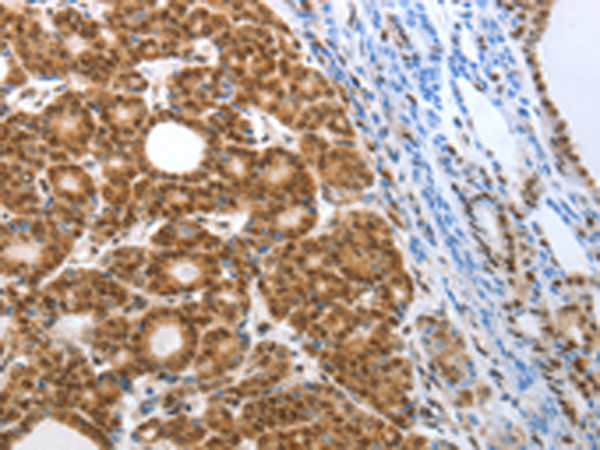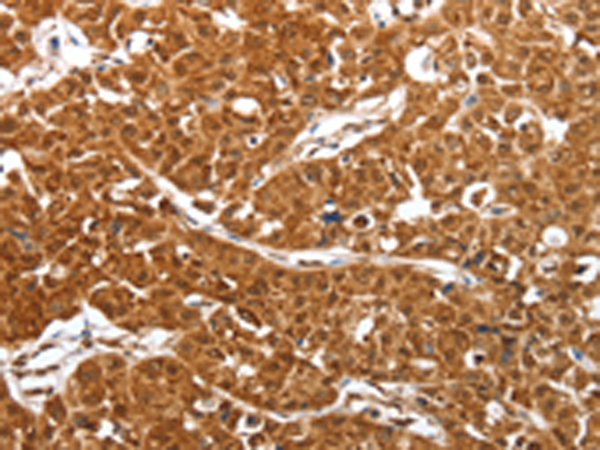


| WB | 咨询技术 | Human,Mouse,Rat |
| IF | 咨询技术 | Human,Mouse,Rat |
| IHC | 1/50-1/200 | Human,Mouse,Rat |
| ICC | 技术咨询 | Human,Mouse,Rat |
| FCM | 咨询技术 | Human,Mouse,Rat |
| Elisa | 1/1000-1/5000 | Human,Mouse,Rat |
| Aliases | BRG1, SNF2, SWI2, MRD16, RTPS2, BAF190, SNF2L4, SNF2LB, hSNF2b, BAF190A |
| WB Predicted band size | 185 kDa |
| Host/Isotype | Rabbit IgG |
| Antibody Type | Primary antibody |
| Storage | Store at 4°C short term. Aliquot and store at -20°C long term. Avoid freeze/thaw cycles. |
| Species Reactivity | Human, Mouse, Rat |
| Immunogen | Synthetic peptide of human SMARCA4 |
| Formulation | Purified antibody in PBS with 0.05% sodium azide and 50% glycerol. |
+ +
以下是关于SMARCA4抗体的3篇参考文献,按文献名称、作者和摘要内容分类整理:
---
**1. 文献名称**:*Loss of SMARCA4 in small cell carcinoma of the ovary, hypercalcemic type: a molecular and immunohistochemical study*
**作者**:Ramos P et al.
**摘要**:本研究通过免疫组化(使用SMARCA4抗体克隆号:ab110641)分析了卵巢高钙血症型小细胞癌(SCCOHT)中SMARCA4蛋白的表达缺失,证实其在超过90%的病例中存在失活突变,验证了该抗体在诊断这类罕见肿瘤中的可靠性。
---
**2. 文献名称**:*SWI/SNF complex heterogeneity in human cancers: differential roles of SMARCA4 and SMARCB1 mutations*
**作者**:Shain AH et al.
**摘要**:研究比较了不同SWI/SNF复合体亚基(包括SMARCA4)在多种癌症中的突变状态,利用特异性抗体(如SMARCA4抗体EPR3916)进行蛋白表达分析,发现SMARCA4缺失与侵袭性肿瘤表型及化疗耐药性显著相关。
---
**3. 文献名称**:*Utility of SMARCA4 immunohistochemistry in diagnosing thoracic SMARCA4-deficient undifferentiated tumors*
**作者**:Yoshida A et al.
**摘要**:该文献提出一种基于SMARCA4抗体(克隆号:D9M5X)的免疫组化方法,用于快速鉴别胸部未分化肿瘤中SMARCA4缺失病例,强调了该抗体在临床病理诊断中的敏感性和特异性。
---
**4. 文献名称**:*Antibody validation for SMARCA4 in FFPE tissues: technical considerations and pitfalls*
**作者**:Müller DA et al.
**摘要**:文章系统评估了多种SMARCA4抗体在福尔马林固定石蜡包埋(FFPE)组织中的表现,指出部分抗体存在非特异性染色问题,并推荐优化实验条件以提高检测准确性。
---
以上文献覆盖了SMARCA4抗体在肿瘤诊断、机制研究及实验技术优化中的应用。
The SMARCA4 antibody targets the SMARCA4 protein (also known as BRG1), a critical component of the SWI/SNF chromatin-remodeling complex. This complex regulates gene expression by altering chromatin structure, enabling access to transcription factors. SMARCA4. encoded by the SMARCA4 gene, functions as an ATPase to drive these structural changes, playing roles in cell differentiation, proliferation, DNA repair, and tumor suppression. Dysregulation or mutations in SMARCA4 are linked to various cancers, including lung adenocarcinoma, ovarian small cell carcinoma, and malignant rhabdoid tumors. Loss of SMARCA4 expression is a hallmark of SMARCA4-deficient malignancies, often associated with aggressive behavior and poor prognosis.
In research and diagnostics, SMARCA4 antibodies are widely used in immunohistochemistry (IHC) to detect protein expression loss, aiding in tumor subtyping and confirming diagnoses of SMARCA4-deficient cancers. They also serve as tools to study SWI/SNF complex dynamics in epigenetic regulation and cancer biology. Clinically, SMARCA4 status may influence therapeutic strategies, as its loss can correlate with resistance to certain chemotherapies but potential sensitivity to emerging targeted therapies, such as EZH2 or PARP inhibitors. Additionally, germline SMARCA4 mutations underlie rare genetic disorders like Coffin-Siris syndrome, emphasizing its developmental importance. The antibody’s utility spans basic research, cancer classification, and translational studies exploring epigenetic therapies.
×